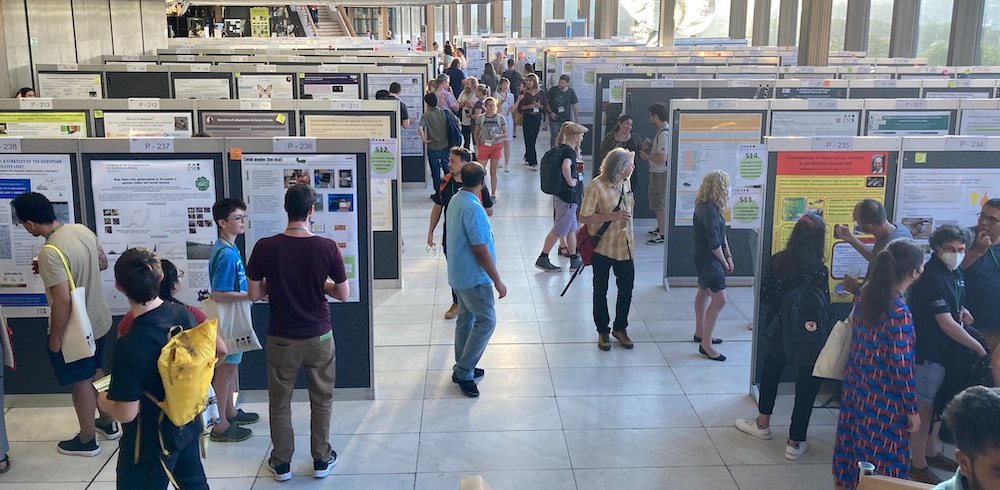Conferences can be scary and overwhelming – especially if you’re about to enter the fast-moving world of academia. Even having over 10 years of experience in doing research and participating in some of the largest conferences in my field – I still feel crippling anxiety every time I about to approach somebody at a large meeting. I still get flooded by waves of heat and racing heartbeats every single time I want to rise my hand and ask a question. What if the question will sound silly? What if the presenter won’t get it – or even worse: what if they misunderstand it? My ongoing struggle with crowd anxiety or self-esteem issues only make things worse.
However – over time I’ve learned that even severe public speaking anxiety can be overcome, and even the shyest and introvert scientists can learn few tricks that help to navigate the intimidating world of congresses and conferences. Here’s what I’ve learned over the years. Even if my ways won’t work at first – they will hopefully convince you that you’re not alone, and that public meetings anxiety is something pretty natural.
1) Instead of throwing yourself into the vortex of people – try to be methodical. Before the conference check who’s attending it. Pick few names that you would like to meet or speak to. Check if they have a talk or poster – that’s the easiest way of meeting people and having a good starter topic.
2) Public speaking anxiety can overwhelm you to the point of losing the ability to speak! The easiest way of convincing yourself you’re all good? Say to yourself that during your talk you’re the expert. You know everything (about your topic ) and the audience is here to hear and admire your talk. You’re their guide and guru for the coming few minutes.
3) Not being able to answer questions after your talk may make you feel bad or afraid of how others judge your performance. But not knowing the answer to a question – or, in fact, not understanding the question! – is totally normal. If it happens just naturally move to the next one. Make sure the person asking the question is not left in the void: invite them for a chat after the talk, or casually suggest meeting over lunch or dinner to elaborate more. You will appear professional – and potentially get another opportunity to meet someone interested in your research.
4) Have a conference buddy – e.g., a colleague from your lab that attends the same conference, or a friend from another university you know is also at the meeting. Having someone to talk too during breaks will make you feel more comfortable and help you relax. Don’t be afraid to ask your friends for help with any sort of anxiety you may feel. Quite often just speaking about anxiety is a great way to weaken its effects on your life.
5) Try not to steer away from round tables and panel discussions – even if you stay quiet most of the time, they are great moments to see more experienced scientists in action. You may learn many under-the-hood secrets of your field, get to know the thought leaders in the discipline, and often forge new collaborations.
8) Always rehearse your talks – either on your own, or in front of your lab-mates. There’s nothing more stressful than a badly rehearsed talk that goes overtime and makes chairpeople to cut your microphone off. But – rehearsing does not mean “memorising”. Avoid learning the “screenplay” of your talk by heart – memorise the main points and try to story-tell around them. It will sound much more natural – and there’s less likelihood you’ll get stuck having forgotten a line or two. Somewhere around the 2/3 of your talk – try to have an emergency connection to your final slides – just in case you do run overtime and are forced to wrap up before reaching the end of your presentation.
7) If you’re organising a conference – see if you can make it a bit more friendly for neurodivergent persons. Few recommendations you might consider include:
- having a quiet corner far from the buzz of the biggest crowd;
- organising a public speaking workshop or mentoring session – i.e., an event that would gently bring likeminded people together and help to break ice more easily;
- organising poster sessions in ways that loosen any excessive crowding – e.g., by having multiple sessions that target alternating poster numbers;
- inviting willing keynote speakers to have an open lunch sometimes during the conference (organised in a way that allows people to easily join or leave without attracting too much attention) – such events are a great way of giving less bold people a chance to meet the big names and start conversations that can than more easily continue during the conference.


 RSS Feed
RSS Feed